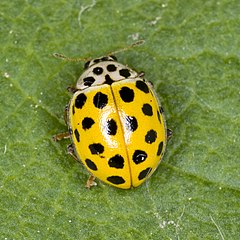Psyllobora vigintiduopunctata
Appearance
| Psyllobora vigintiduopunctata | |
|---|---|

| |
| Scientific classification | |
| Domain: | Eukaryota |
| Kingdom: | Animalia |
| Phylum: | Arthropoda |
| Class: | Insecta |
| Order: | Coleoptera |
| Family: | Coccinellidae |
| Genus: | Psyllobora |
| Species: | P. vigintiduopunctata
|
| Binomial name | |
| Psyllobora vigintiduopunctata | |
Psyllobora vigintiduopunctata (often abbreviated to Psyllobora 22-punctata), the 22-spot ladybird, (earlier known as Thea vigintiduopunctata) is a common, 3–5 mm long ladybird native to Europe.[2] The elytra are yellow in colour with 22 black spots. The pronotum is yellow or white with 5 black spots.[3] Unlike most other ladybirds which feed on aphids, P. 22-punctata eats mildew — especially from umbellifers and low-growing shrubs .[4] The 22-spot ladybird is best looked for amongst low vegetation.[5]

References
- ^ Linnaeus, C. 1758. Systema Naturae per regna tria naturæ, secundum classes, ordines, genera, species, cum characteribus, differentiis, synonymis, locis, Tomus I. Editio decima, reformata. Holmiæ: impensis direct. Laurentii Salvii. i–ii, 1–824 pp
- ^ G. Bradley (2006). "22-spot ladybird". UK Safari.
- ^ Ansari Pour A, Shakarami J. Recognition of ladybird fauna (Col.: Coccinellidae) in the alfalfa fields of Khorramabad. The Journal of Animal & Plant Sciences. 2012; 22(4):939-943.
- ^ Michael Chinery (1993). Collins Field Guide: Insects of Britain and Northern Europe. 3rd edition. HarperCollins. ISBN 0-00-219918-1.
- ^ Mathias, Dilllen (April 18, 2017). "Stronger diversity effects with increased environmental stress: A study of multitrophic interactions between oak, powdery mildew and ladybirds". PLOS ONE. 12 (4): e0176104. doi:10.1371/journal.pone.0176104. PMC 5395233. PMID 28419174.
 Media related to Psyllobora vigintiduopunctata at Wikimedia Commons
Media related to Psyllobora vigintiduopunctata at Wikimedia Commons Data related to Psyllobora vigintiduopunctata at Wikispecies
Data related to Psyllobora vigintiduopunctata at Wikispecies
